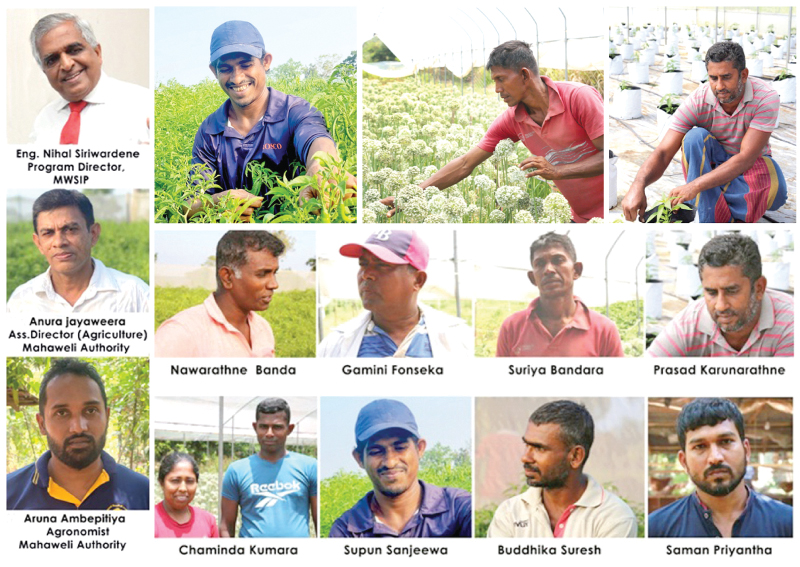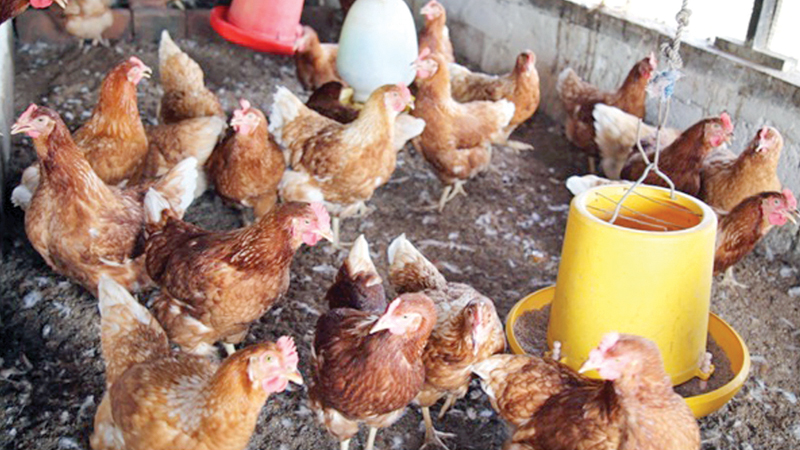Showing a hopeful sign for the future of agriculture in Sri Lanka, young farmers are finding success through innovative methods that blend smart technology with tradition. Adopting smart, cost-effective practices not only boosts the yield but also creates the potential to contribute significantly to the national economy. We hear many positive sounds from Mahaweli systems, where significant income is gained from emerging smart best practices.
Enthusiastic Mahaweli young farmers are thriving under the Agricultural Production and Productivity Enhancement Program (APPEP), implemented by the agriculture division of the Mahaweli Authority of Sri Lanka (MASL) with the financial support of the Asian Development Bank (ADB) in coordination with the Mahaweli Water Security Investment Program (MWSIP).
Recently, a group of journalists had the chance to accompany MASL officials to meet these successful smart young farmers. Their stories showcase how innovation and investment are driving positive change in Sri Lanka’s agricultural sector.
Mahaweli entrepreneurs
First, we visited the farm plot of a young farmer, Supun Sanjeewa, in Meegaswewa block of Mahaweli System “D”. The small farm plot fully covered with ‘tollnet’ could only be visible on the land. The plot was around 0.25 acre near the Agro-well. The drip irrigation system made up of a flexible pipes network was installed to pump out the water from the well into the covered farm plot.
The officials of MASL invited us to see the cultivation plot and to talk to Supun Sanjeewa.
Inside of small farm plot was lush green with a high density of chilli plants bearing thousands of green chilli pods. The earth was covered by the black Polythene and well-grown chilli plants had been cultivated in little lifted small beds arranged in order. The drip irrigation system running around beds provided water and liquid fertiliser to each chilli plant. The area was covered by a three metre high insect-proof net and nothing was visible outside.
Sanjeewa said, “I was selected for this Mahaweli program to start smart chilli cultivation. This covering net and drip irrigation systems were given to me along with guidance and technical knowledge. I planted 5,200 chilli plants in this plot and am now harvesting and selling them. This smart method is well suited for us and easy to manage. I have spent nearly Rs. 230,000 as the cost of establishment and management. I earned nearly Rs.1,000,000 up to now and there’s more to harvest.”
Nawarathna Banda was a highly successful farmer who practised the same methodology and earned well by green chilli production. Being motivated by this smart method, he has a plan to expand his farming. He explained to us his achievements and expectations.
“I have harvested nearly 3,000kgs of green chilli and sold them around Rs.1,000 per 1 kg. I could make a profit of more than 2.3 million from my cultivation. I was lucky to get a good market price during the previous chilli shortage period. We don’t want to make an extra effort for weed control, fertiliser application and not much labour needed. I hope to start another plot of smart cultivation to double my income.”
Another group of farmers are engaged in chilli cultivation in polytunnels provided by the APPEP for producing hybrid seeds for the next season for growers. The beneficiary farmers grow crops in the polytunnels as the field staff of MASL is giving technical guidance. We met some of the chilli seed producers as well.
“I am growing 220 chilli plants in this polytunnel and expect to produce nearly 20 kgs of chilli seeds variety, MICHhy 1. Mahaweli officers are giving immense support and knowledge for us to continue this. This new method would be useful for us as we can go for better income. I expect to earn around 25,000,000-3,000,000 by producing hybrid seeds here,” chilli seed producer Indika Gunasekara said.
Program design
MWSIP Program Director Eng. Nihal Siriwardane said, “This whole program consists of five key components as, the setting up of a polytunnel for chilli seed production, supply of smart agriculture packages for green chilli production and driers for producing dry chilli, seed supply for big onion and maize cultivation, setting up of rain shelter for big onion seed production, and enhancement of egg production. The MWSIP provides coordination and monitoring support with the ADB for this program.”
Assistant Director (Agriculture) of the MASL, Anura Jayaweera said, “Covered chilli cultivation plots are being grown by selected Mahaweli young farmers to produce green and dry chillies. We provided them with an insect-proof net, drip irrigation system, and training under the component of supply of smart agriculture packages. This method enables farmers to manage their crop both in water shortage as well as in rain season.”
“We distributed smart packages among 600 farmers. As you see, everyone is earning better now. We have also given input supports for selected farmers by distributing 50 units of Polytunnels for hybrid chilli seed production, and it is also in progress. The ADB has allocated 2 USD million for this initial program through the MWSIP.”
The APPEP is under implementation in Mahaweli system B, C, D, G, H, and the Huruluwewa area in the dry zone where there is a high potential for chilli, maize, and big onion. The program goes with smart agriculture practices upon appropriate use of agricultural technology. As most of the young farmers are leaving agriculture in Mahaweli regions, this program was designed and initiated to retain them in farming.
The Covid-19 pandemic, Dollar crisis, and the fertiliser shortage made farmers face severe difficulties. The food security issues and level of nutrition also emerged as focused matters with the downsizing of agriculture and poultry farming.
The APEP aimed to address the shortage of quality seeds, as farmers spend lots of money purchasing seeds to initiate cash crop cultivations. Hence, a seed production program mainly for big onion and chilli production was included in the APPEP.
Onion seed producers
Promoting farmers for the production of onion seeds and making them available for the Mahaweli farmers while generating a good income for producers were part of the APEP. About 150 Mahaweli farmers have been provided rain shelters and technical know-how to engage in onion seed production by cultivating big onions.
Onion cultivator Gamini Fonseka of Galkiriyagama in Huruluwewa said, “I have been growing onions for nearly 20 years. We used to find Indian onion seeds for cultivation. Now, we turned into onion seed production with the support of the Mahaweli Authority and the Department of Agriculture. I have cultivated 120 kgs of onion and expect to get 12kgs of seeds. One kg of seeds goes at Rs.35,000 in the market now. I invested about Rs.10,000 for this. I hope to use my own seed production for the next cultivation.”
S.R. Suriya Bandara also of Galkiriyagama said, “ I received this rain shelter unit from the Mahaweli program. Mahaweli officers gave great support to us sharing technical knowledge and guidance timely. Earlier, our farmers were leaving onion cultivation due to a shortage of onion seed and market price fluctuation. But, we see more farmers are getting into the cultivation now. ”
The shortage of poultry feed badly affected the industry with the previous Dollar crisis. The program took steps to assist and back up the poultry growers to restore their livelihood while addressing the nutrition issue in the area.
About 41,500 one-month-old chicks together with startup poultry feed were provided for 831 families who have had previous experience. The poultry growers are earning a substantial income now.
Saman Priyanth of the Mahaweli system “C”, who graduated from the University of Rajarata has entered into poultry rearing with this input support and managing it with a better income.
“I received 50 chicks with feeding stuff sufficient to five months. My seven-month-old flock is producing eggs now. The average egg production per day is about 49. My monthly income is around Rs.60,000 and I get a net profit of Rs. 30,000 monthly. I have adequate experience to expand this business further by adding 50 or 100 chicks more, ” Saman said.
Agronomist of the MASL Aruna Ambepitiya said, “Earlier, there were about 11,500 poultry growers in Mahaweli areas. Later, they faced lots of challenges due to a shortage of feeding materials, and medicines and the non-availability of startup chicks with the economic crisis. This situation highly affected our poultry farmers and they couldn’t continue their livelihood. Egg shortage and high prices in the market affected protein deficiency among children.”










